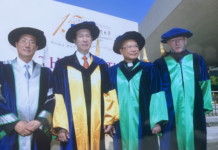The South African Institute for Distance Education (SAIDE) has published its latest newsletter. Two articles caught my eye.
Mhlanga, E. (2010) SOFIE (Strengthening Open and Flexible Learning for Increased Education) Project Findings SAIDE Newsletter, Vol. 16, No. 2
The aim of this study was to increase access to education and learning for young people affected by HIV and AIDS in Malawi and Lesotho by developing, trialing and evaluating an expanded model of schooling which used open, distance and flexible learning (ODFL) to complement conventional schooling. The key design is the development of ‘circles of support’ that provide learning materials and teacher support for students who miss classes because of the need to care for family with HIV/AIDS. Although these are only preliminary results, the findings indicate that the intervention was successful, leading to less drop-out from school, and improved academic performance. (Note: this is not e-learning but print based support).
Preston, D. and Moore, A. (2010) The Use of Open Education Resources at the University of Malawi SAIDE Newsletter, Vol. 16, No. 2
During 2009 the University of Malawi (UNIMA) embarked on two OER projects, one at the Kamuzu College of Nursing and the second at the Bunda College of Agriculture. These projects were co-funded by the Open Society Initiative for Southern Africa (OSISA) and the William and Flora Hewlett Foundation, and facilitated jointly by SAIDE’s OER Africa Initiative and the International Association for Digital Publications (IADP).
At Kamuzu College of Nursing an interface was designed to hold the digital resources together in a manner that promoted the use of Problem-based Learning. This courseware is licensed under a creative commons licence and is freely-available on the OER Africa website.
At the Bunda College of Agriculture, the Language and Communication for Development Department decided to develop a textbook to address problems of staff and students not having access to the same set of textbooks despite their Communications Skills classes being a core course for all first year students. Secondly, students could not always access the recommended readings as the College Library did not have, or had an insufficient number of the texts. The 102 page Communication Skills textbook, which was created exclusively from OER, was released in early-2010 and has been offered back to the OER community. It is available from both the Bunda College website and the OER Africa website.
Again it is early days and immediate results for both the OER projects have been somewhat mixed but with promise for the future.
Also in this issue, the launch of the African Health OER Network was announced. The network provides a platform for African health academics to freely access and share educational materials as well as to debate key issues around the future of health education for healthcare workers in Africa. The aim of the network is to share and circulate health-related educational materials by building links to existing resources (e.g., programmes, modules, courses), which authors have shared under a Creative Commons licence.









 Dr. Tony Bates is the author of eleven books in the field of online learning and distance education. He has provided consulting services specializing in training in the planning and management of online learning and distance education, working with over 40 organizations in 25 countries. Tony is a Research Associate with Contact North | Contact Nord, Ontario’s Distance Education & Training Network.
Dr. Tony Bates is the author of eleven books in the field of online learning and distance education. He has provided consulting services specializing in training in the planning and management of online learning and distance education, working with over 40 organizations in 25 countries. Tony is a Research Associate with Contact North | Contact Nord, Ontario’s Distance Education & Training Network.

